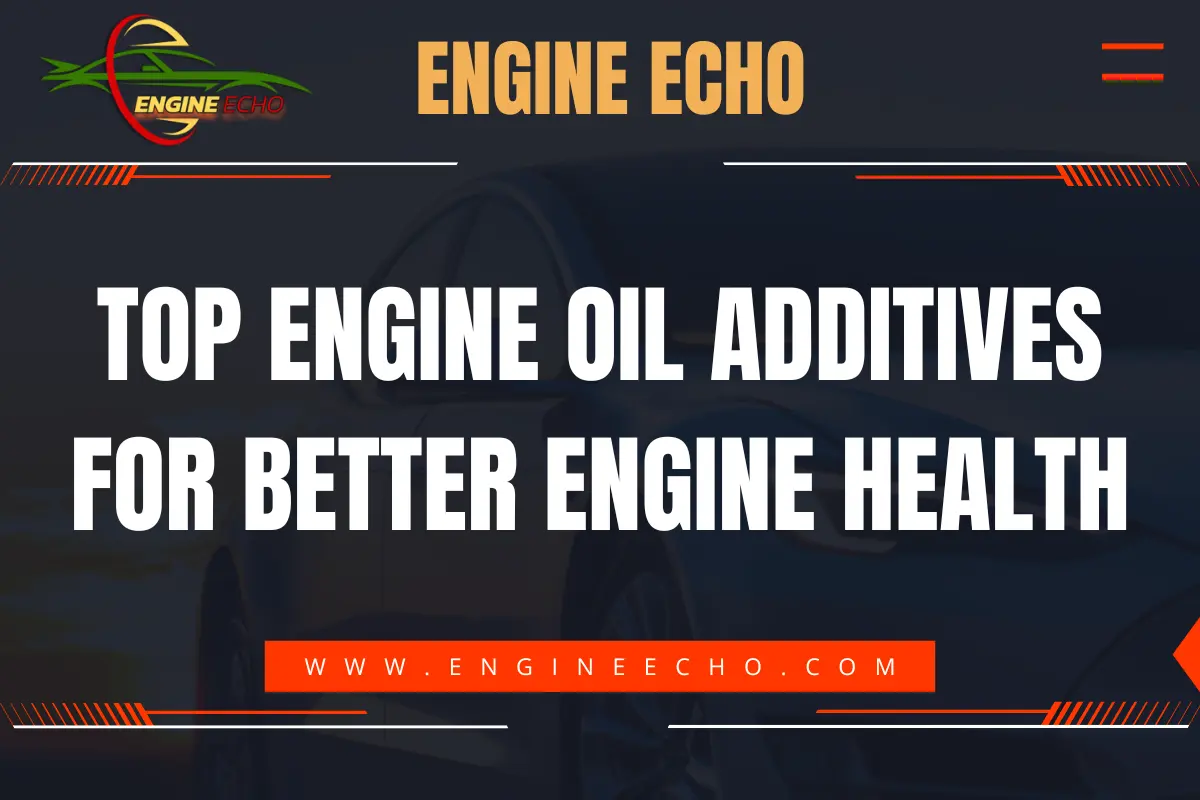Top Engine Oil Additives for Better Engine Health

Key Takeaways:
- Engine oil additives improve performance by reducing friction, cleaning internal components, and protecting against corrosion.
- Various types of oil additives serve specific roles such as anti-wear, friction reduction, and preventing sludge buildup.
- Proper use of oil additives can prolong engine life, improve fuel efficiency, and extend oil change intervals.
- Not all engines require oil additives, and their usage should align with the manufacturer’s recommendations.
- While oil additives offer significant benefits, overuse or improper application can lead to engine issues.
Introduction
After years of tweaking and maintaining my engines, I’ve learned that sometimes the smallest changes—like adding engine oil additives—can make a huge difference. They may not be the flashiest thing in your toolbox, but trust me, when it comes to keeping your engine running smoothly, they’re worth their weight in gold. Whether you’re trying to extend the life of your high-mileage vehicle or just want to protect a newer engine, oil additives can be a game-changer.
How Engine Oil Additives Work
Engine oil additives are like giving your engine oil a bit of a boost. They help your oil flow better, reduce friction, and keep the bad stuff floating around so it can get filtered out. I’ve used these in my own vehicles, and the difference in how the engine runs is noticeable, especially as it gets older.
- Modify Viscosity: Additives help your oil stay at the right thickness, whether it’s cold or hot outside, ensuring your engine keeps running smoothly.
- Reduce Friction: Less friction means less wear and tear on your engine parts, which improves performance and fuel efficiency.
- Clean and Protect: Detergents and dispersants help keep your engine clean, preventing sludge buildup while antioxidants stop the oil from breaking down too quickly.
Types of Engine Oil Additives
Each type of oil additive plays a unique role in protecting your engine. Here are some of the most useful ones:
Detergents and Dispersants
- Purpose: These guys are like the janitors of your engine, keeping it clean by preventing sludge and deposits from building up.
- Benefits: They keep metal parts free from harmful buildup and help ensure smooth operation.
- Personal Experience: I’ve noticed fewer performance dips between oil changes since I started using detergents. My engine runs cleaner, meaning I can go longer between oil changes.
Anti-Wear Agents
- Purpose: Protect metal surfaces from friction and wear.
- Benefits: These additives, such as ZDDP, create a protective layer over metal parts, reducing wear, especially in high-mileage or older engines.
- Personal Recommendation: I’ve used anti-wear agents in my older SUV, and they’ve been key in reducing engine noise and wear, especially in colder weather.
Viscosity Index Improvers
- Purpose: Stabilize oil viscosity across a wide range of temperatures.
- Benefits: These additives keep your oil just the right thickness, whether you’re driving through a freezing winter or a scorching summer.
- Personal Experience: If you live in extreme weather like I do, viscosity improvers can be a real lifesaver, ensuring your engine is protected no matter the temperature.
Friction Modifiers
- Purpose: Reduce friction between engine parts.
- Benefits: These can boost fuel efficiency and reduce wear by lowering the internal friction in the engine.
- My Experience: I’ve used friction modifiers in my daily driver, and they’ve consistently improved my fuel economy, adding a little extra mileage to each tank.
Corrosion Inhibitors
- Purpose: Protect metal surfaces from rust and corrosion.
- Benefits: Corrosion inhibitors are key in preventing rust, especially for engines exposed to moisture.
- Personal Experience: Living in a humid climate, corrosion inhibitors have been a must-have for me to keep my engine in top shape, particularly when my car isn’t driven for a while.
Antioxidants
- Purpose: Prevent the oil from oxidizing and breaking down over time.
- Benefits: Antioxidants help keep the oil stable for longer, extending the time between oil changes.
- Personal Experience: Since I’ve started using antioxidants, my oil stays cleaner longer, which has really helped in reducing how often I need to change it.
Top Engine Oil Additives Brands
When it comes to choosing the right oil additives, going with trusted brands has always worked best for me. Here are a few that stand out:
Lucas Oil Products
- I’ve had great results with Lucas Oil, especially in high-mileage vehicles. Their additives reduce friction and protect against wear, which has kept my older engines running smoothly.
STP Oil Additives
- STP’s additives do an excellent job of keeping engines clean by preventing sludge buildup. If you’re looking for something to keep your engine free of gunk, they’re a solid choice.
Liqui Moly
- For performance improvements and long-term engine protection, Liqui Moly is one of my go-to brands. I’ve seen smoother engine operation since I started using their additives.
Royal Purple
- Royal Purple is a premium option, especially for high-performance engines. Though they can be pricier, the results are worth it. I’ve used them in my performance cars, and they’ve really helped reduce engine wear during long drives.
Marvel Mystery Oil
- This is a versatile product I’ve used in both gas and diesel engines. It’s a great all-around additive that’s especially good at cleaning the fuel system and boosting fuel economy.
Benefits of Using Engine Oil Additives
From my experience, using oil additives has provided several significant benefits:
- Improved Efficiency: Reducing friction and wear means your engine runs more efficiently and uses less fuel.
- Longer Engine Life: Additives protect engine parts, which helps extend the overall life of your vehicle.
- Cleaner Engine: Detergents and dispersants prevent the buildup of harmful sludge, keeping your engine cleaner.
- Fuel Economy: Friction modifiers have noticeably improved my fuel efficiency, giving me more miles per gallon.
Choosing the Right Oil Additive for Your Engine
Selecting the right additive can make all the difference. Here are a few things I’ve learned to consider:
- Engine Type: Diesel engines need different additives than gasoline engines.
- Engine Age: For older engines, anti-wear additives have been a lifesaver for me, while newer engines often benefit from friction modifiers for fuel efficiency.
- Driving Conditions: If you live in a climate with extreme temperatures like I do, viscosity index improvers can protect your engine through thick and thin.
Always check your vehicle’s manual for recommendations, but in my experience, a little extra research can help you make the best choice.
Common Myths and Misconceptions About Engine Oil Additives
Over the years, I’ve come across a lot of myths about oil additives. Here’s what I’ve learned:
- Myth 1: “All engines need oil additives.”
Not necessarily. High-quality synthetic oils already contain some additives, but if you’ve got an older or hard-working engine, an extra boost can really help. - Myth 2: “Additives can replace regular oil changes.”
This is a common misconception. While additives can improve engine performance, nothing replaces a regular oil change. Trust me, skipping oil changes leads to bigger headaches down the road. - Myth 3: “Synthetic oils don’t need additives.”
Even synthetic oils can benefit from additives, particularly in high-mileage vehicles. I’ve used them in several of my cars, and the difference is clear—especially in engines with a lot of miles on them.
Performance Testing of Oil Additives
Oil additives go through various tests to prove their effectiveness, but here’s what I’ve seen firsthand:
- Oxidation Resistance: Additives with antioxidants help keep the oil from breaking down too quickly, which means fewer oil changes.
- Wear Resistance: Anti-wear agents do a great job of protecting your engine’s metal parts, especially in older engines.
- Real-World Results: I’ve used friction modifiers in my own vehicles, and they’ve boosted my fuel economy almost immediately. A nice bonus that keeps me coming back to these products.
How to Use Engine Oil Additives
Using oil additives is easier than it might seem, but here’s what I’ve learned along the way:
- Dosage: Always follow the manufacturer’s recommended dosage to avoid overuse.
- Timing: I like to add additives during oil changes to make sure everything mixes in properly.
- Frequency: Some additives should be used every oil change, while others are more occasional. I’ve found that sticking to a routine gives the best results.
Potential Drawbacks of Oil Additives
While I’m a big fan of oil additives, there are some things to be mindful of:
- Overuse: Too much of a good thing can be harmful. Always follow instructions to avoid overloading your engine with additives.
- Compatibility: Not all additives work with every engine. I’ve learned to always double-check before using a new additive, especially in different types of vehicles.
- Cost: High-quality additives can be pricey, but from my experience, the long-term benefits make them worth the investment.
Case Studies on Engine Oil Additives
Case Study 1: High-Mileage Vehicles
I used a friction modifier in my SUV with over 150,000 miles, and it boosted my fuel efficiency by 10%. It also reduced oil consumption, which saved me money in the long run.
Case Study 2: Commercial Fleet
A friend who manages a delivery fleet added oil additives to extend oil change intervals. It saved them 15% on overall maintenance costs, a big win for efficiency and budget.
Case Study 3: High-Performance Engines
In my high-performance car, I’ve noticed smoother operation and reduced engine wear after adding a high-quality anti-wear additive. It’s made a big difference, especially during longer drives.
Future Trends in Engine Oil Additives
The future of oil additives is looking bright, with a few exciting trends on the horizon:
- Eco-Friendly Additives: More environmentally friendly and biodegradable options are emerging as sustainability becomes a bigger focus.
- Synthetic Additives: Advanced synthetic formulas are being developed to keep up with modern engines and their unique needs.
- Electric Vehicle Lubricants: As electric vehicles become more common, new types of additives are being designed to protect electric motors and extend their life.
Conclusion
After years of using engine oil additives, I’m a firm believer in their ability to improve engine performance and extend the life of your vehicle. Whether you’re working with an older engine or want to get the most out of your car, the right additive can make a world of difference. From my experience, a small investment in a quality additive pays off in the long run, keeping your engine running smoothly and efficiently for miles to come.
Frequently Asked Questions (FAQs)
Q1: Do all engines need oil additives?
A: Not all engines require them, especially if you’re using high-quality synthetic oils. However, older engines or those under heavy use can benefit from additional products.
Q2: Can oil additives replace regular oil changes?
A: No, oil additives are a supplement, not a substitute for regular oil changes.
Q3: What is the best additive for a high-mileage engine?
A: Anti-wear agents and friction modifiers are excellent for high-mileage engines, helping reduce wear and improve fuel efficiency.
Q4: Can I use multiple additives at once?
A: Be cautious when combining additives. Some products can interact negatively with each other, so it’s best to stick to one at a time unless recommended.
Q5: Are oil additives safe for all engine types?
A: Most are safe, but always check compatibility with your engine and oil type.
Thanks for checking out this article on EngineEcho.com! Hope you found this article: "Top Engine Oil Additives for Better Engine Health" helpful! If you liked it and want to dive into more car engine topics, head over to our homepage. There's always something new to discover in the world of engines. Enjoy your reading journey!
Check out our previous article: Best Engine Oil Additive for Performance






